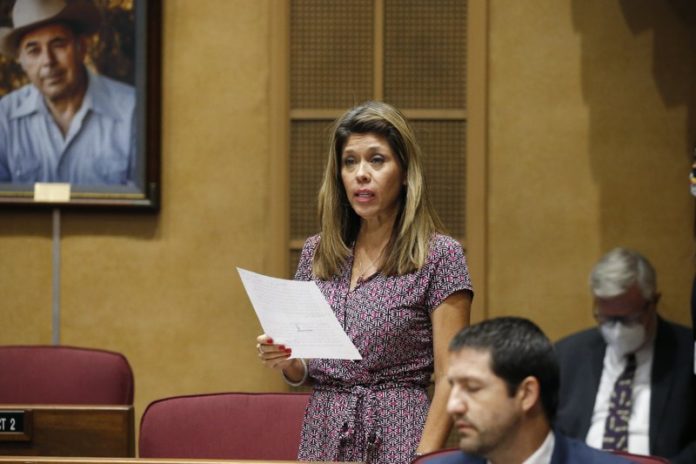
The Arizona Senate abruptly adjourned for the year Tuesday, leaving for an expected special session legislation protecting businesses from liability lawsuits if their employees or patrons contract the coronavirus.
The liability proposal passed by the House last week had faced an uphill battle in the Senate, where Republican President Karen Fann hadn’t committed to put it up for a vote. The same was true of legislation detailing how $88 million in emergency federal cash fro child care centers would be spent by the state.
Fann had planned to hold votes on 28 House bills that just needed Senate approval to head to Republican Gov. Doug Ducey’s desk.
But the 16-14 vote held minutes after the Senate came into session officially ended a 2020 legislative session that was interrupted in March by the coronavirus pandemic.
The Senate returned on May 8, just to vote to adjourn. But the House returned last week, enacting several dozen minor bills and the two that deal with the virus before voting to end their session.
Lawmakers are expected to be called back to work by Ducey in special sessions in coming weeks to handle virus-related issues, including a business liability proposal.
The House proposal providing sweeping immunity to businesses from lawsuits filed by people infected on their premises also contained a provision stripping criminal penalties from the governor’s emergency orders that closed businesses. Ducey has dodged questions about whether he would signed it.
The Senate had planned to take up 28 minor bills on Tuesday and decide on whether to act on the virus bills. But minority Democrats moved to immediately adjourn and three Republicans joined them in voting to end the session.
The Senate had voted on May 8 to adjourn but the House moved ahead. Republican Sen. Kate Brophy McGee was among those wanting the session to end early this month and voted again Tuesday to adjourn.
“We have much bigger fish to fry in terms of … a special session and issues related to the COVID virus and economic recovery and that’s what I’m focused on,” Brophy McGee said.
Republican Senate President Karen Fann said she had expected Democrats to move to end the session, but not immediately at the start of Tuesday’s session.
“It’s a shame we weren’t able to get the 28 House bills that we were hoping to get done,” Fann said. “There’s some really good economic development, which can be COVID-related bills, so I’m hoping we get as many as possible in our special session.”
Republican Sen. J.D. Mesnard also lamented the adjournment, saying it would have taken only few minutes to vote for the bills Fann had put on the agenda.
“That’s disapointing, because literally we’re all here,” Mesnard said. “This seems to be motivated by something beyond this — I’m not sure what it’s motivated by.
Republican Sen. Eddie Farnsworth helped craft the business liability bill that now will be delayed until the special session. He said the Senate’s failure to act will prevent some businesses from opening because they are scared of coronavirus liability.
“What we’ve done is we’ve left those businesses hanging at a time where we have a tremendous economic downturn,” Farnsworth said. “So for us to abdicate our responsibilities and walk away from this job is in my opinion unconscionable.”
Democratic Sen. Lupe Contreras, who was infected with the virus along with several family members, said the liability bill didn’t protect workers or patrons from businesses that ignore the need to use social distancing and other measures to prevent the virus from spreading.
“I think we have to do something — I don’t think that was the right bill,” Contreras said. “If your server at your business serves somebody alcohol that they shouldn’t … you’re responsible,”
Contreras added: “So why aren’t you responsible for making sure they’re socially distanced? There have to be rules in place.”
Republished with the permission of the Associated Press.












